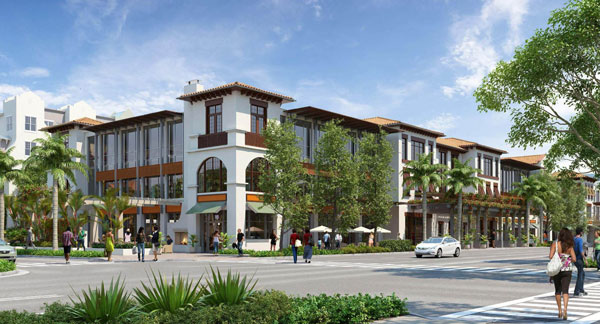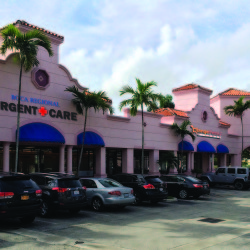Delray Beach grows up
June 29th, 2017
Over the past 20 years, Delray Beach has steadily grown its reputation by developing its Atlantic Avenue corridor into a high-end destination for restaurants, bars, nightclubs and boutiques with a small-town feel and just blocks from the ocean.
Now, it looks to be growing into something more. “Delray used to be a quiet, sleepy town,” said John Jaspert, a vice president of tenant representation at CBRE in Boca Raton. “This is now a hot destination for everyone from millennials to empty nesters. It has matured. And if it can build Class A office space, more tenants will come.”
Steve Michael, co-founder of Hudson Holdings, which is working on a major mixed-use project just off Atlantic Avenue, compares the development of downtown Delray to that of Lincoln Road in Miami Beach over the past 25 years.
“Delray is on the verge of a retail, office and commercial renaissance,” Michael said. “It’s graduating from restaurant to retail to office to hotel, just like Lincoln Road. This will become the major retail corridor in Palm Beach County, primarily between Swinton Avenue and I-95.” He predicts the retail rents in the area will triple to $300 per square foot over the next 10 years.
One area in particular that’s seeing a lot of development interest is the 4.1-mile Congress Avenue corridor near downtown, “which has been an underperformer forever,” said ex-Delray mayor Jeff Perlman, who is now executive vice president for CDS International Holdings, based in Delray and Boca. He chaired a real estate task force charged with jump-starting activity in the area. “We are seeing a lot of interest for mixed-use projects,” Perlman said.
The biggest treasure in that area may be the 540,000-square-foot ex-Office Depot headquarters at South Congress Avenue and Germantown Road, which has been abandoned since 2008. There is talk of a mixed-use project there, said Keith O’Donnell, a principal in the capital markets group of Avison Young in Boca. But no details have emerged yet.
One comp for the area was Kaufman Lynn Construction’s decision last year to move from Boca to a 23,000-square-foot Class A office building now under construction at 3185 South Congress Avenue. The complex will also include a freestanding 132,000-square-foot self-storage facility.
The South Federal Highway (U.S. 1) corridor between Atlantic Avenue and Linton Boulevard is another area of interest, Perlman said. The four-year-old Franklin apartment complex, with 180 units near U.S .1 and Linton, has helped draw residents. The area also includes an LA Fitness, Trader Joe’s and the popular farm-to-table restaurant Max’s Harvest.
In downtown Delray, the city recently settled a $40 million lawsuit with the developer of the mixed-use Atlantic Crossing complex, first proposed in 2011, at a nine-acre site spanning Northeast First Street to Atlantic Avenue and from Northeast Sixth Avenue to Veterans Park. Ohio-based Edwards Cos., the developer, alleged that the city has purposefully stalled the project, costing the company millions.
The $200 million Atlantic Crossing is slated to include 82 luxury condos, 261 apartments, 83,000 square feet of office space and 76,000 square feet of retail and restaurants. The development must still be approved by three city boards. Delray mayor Cary Glickstein, a developer himself, hopes construction can begin in late summer or early fall. “That’s obviously a very important location,” he said.
The project could be completed within three years, said CBRE’s Jaspert. “This could be similar to [developments on] Brickell Avenue in Miami and Las Olas Boulevard in Fort Lauderdale,” he said. “People want downtown living.”
The other major project downtown is a mixed-use development for iPic Entertainment on Fourth and Fifth avenues just south of Atlantic Avenue. The project includes a 20,000-square-foot, eight-screen luxury movie theater, 42,000 square feet of Class A office space, a 90-space parking garage and 8,000 square feet of retail space. iPic will move its headquarters there from Boca.
The project has sparked some controversy, with critics saying it’s too big for the neighborhood. “But most people view it as a net positive,” Glickstein said. “We need a movie theater and office space downtown, and this project addresses both.”
There’s also some momentum for boutique hotels. In April, Samar Hospitality landed a $24 million construction loan to build a five-story, 122-room Aloft hotel at 202 Southeast Fifth Avenue. The hotel will be part of a mixed-use project that will include 35 condos and 6,280 square feet of retail space.
Alan Mindel, managing member of the Jericho, New York-based Samar, said he’s impressed with Delray. “It has a 21st-century approach to the way a village should be set up,” he said. “It’s a pedestrian community with a lot to do and easy access to office space.”
Meanwhile, Hudson Holdings of Delray Beach, which specializes in historic redevelopment, has plans for a 130-room Hilton Canopy at the corner of Southeast First Avenue and Southeast First Street across the street from historic Sundy House, which Hudson already owns. “There’s a huge demand for additional rooms,” said Hudson’s Michael. The project also includes retail and residential space.
In addition, plans are in the works to rejuvenate “what has historically been the toughest” area, as Perlman called it, a community off Atlantic Avenue, just east of I-95. “There’s interest in a grocery store, and small retail and restaurants are looking at going into an area people have avoided for decades,” he said.
A Publix developer has a property offer for one of the blocks, Glickstein said. “We look forward to adding an urban grocer to the area, which the community has requested for some time.”
To be sure, experts agree that Delray does have some real estate issues that need to be addressed. One is the lack of Class A office space. “There’s pent-up demand for that,” said CBRE’s Jaspert. “You have the lifestyle, schools and cultural scene, but you haven’t had office product there.”
Perlman said the solution to the office-space shortage may not be Class A, but rather more creative office product like co-working spaces.
Another problem is that with the demise of regional malls, national stores are increasingly looking for real estate in downtowns such as Delray’s, Glickstein said, which drives up rent for local retailers.
“This is making it harder for mom-and-pop businesses to thrive on Atlantic Avenue,” he said. “You can’t dig a moat around downtown, but if you don’t manage properly, the charm can disappear.”
Source: TRD


Leave a Comment